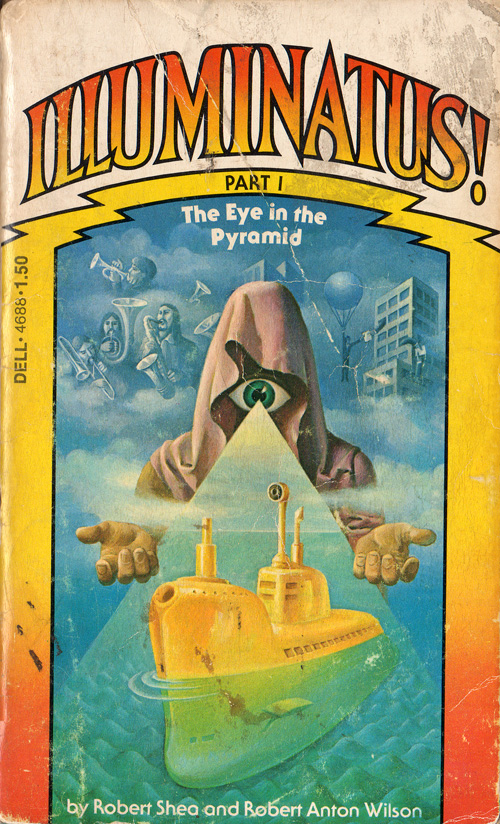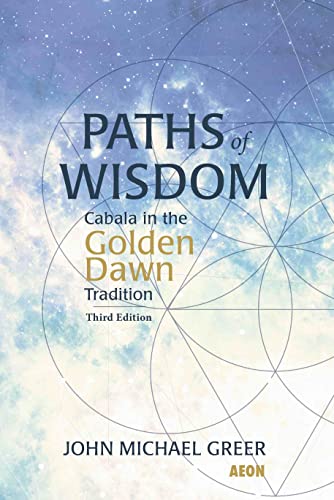Illuminatus!
Jul. 21st, 2020 03:06 pm Maybe it's just an idiosyncrasy of mine, but the older I get, the more my interests focus on making the most of the ideas and interests and commitments I've already got, rather than zooming off into new territory. It's as though when I was young, I spent my time collecting raw materials, and now that I've got a good collection it's time to do something with them.
Maybe it's just an idiosyncrasy of mine, but the older I get, the more my interests focus on making the most of the ideas and interests and commitments I've already got, rather than zooming off into new territory. It's as though when I was young, I spent my time collecting raw materials, and now that I've got a good collection it's time to do something with them. That gradual shift of focus has sent me back to the books that influenced me most powerfully in my teens and twenties. A few evenings ago, as part of that, I pulled my battered old first edition copies of Robert Shea and Robert Anton Wilson's Illuminatus! trilogy down from my bookshelves for the first time in something like thirty years.
I suspect most of my readers have at least heard of the trilogy in question. For those who haven't, it's a giddy satirical romp of a tale in which two New York cops start on the trail of the uber-conspiracy to end all conspiracies, the Bavarian Illuminati, and quickly get entangled in a preposterous set of events in which a giant golden submarine crewed by anarchists, a Las Vegas pimp, the number 23, H.P. Lovecraft, the head of all organized crime in North America, a plague that could end all life on earth, talking dolphins, Nazi zombies, Yog-Sothoth, fnord, and the ruins of ancient Atlantis all play parts -- and that's just for starters.
It's very much a product of its time, full of sex, drugs, and rock'n'roll back when those hadn't become quite so hackneyed in literature and the downsides of the counterculture's habits were still easy to ignore. It's also got the very odd attitude you so often saw in fiction written by men during that era, in which women who were "liberated" inevitably demonstrated that by making themselves sexually available to every man in sight. (Rereading the series has given me a little more insight into the forces that made 1970s feminism inevitable.) The writing is uneven, and the nonlinear narrative -- very fashionable in avant-garde fiction in those days -- doesn't always work. Nonetheless, it was (and is) a lively read, and it had a huge influence on a very broad swath of late 20th century alternative culture.
It also had a huge influence on me. I'm not an original thinker; my imagination needs an existing stock of ideas to work with, which is why my most successful fiction was riffing off either Ernest Callenbach's Ecotopia (Retrotopia) or Lovecraft's Cthulhu mythos (The Weird of Hali and its associated novels), and why my best occult writing always involves starting from an existing body of tradition and then doing new things with it. One of the reasons I've been reading the books that shaped my imagination in my younger days is precisely to trace some of my ideas to their roots. I found quite a number of those ideas in the three volumes of Illuminatus! -- including a good many whose source I'd forgotten. My readers will doubtless have seen me noting that belief in coincidence is the most common superstition of the age of science; that was nearly a word-for-word quote from one of the trilogy's characters.
The thing that struck me most forcefully, though, was the extent to which my whole venture into tentacle fiction was subconsciously shaped by the Illuminatus! trilogy. The central theme of the Haliverse, the confrontation between the arrogance of human reason and the reality of a universe too vast and intricate for us to understand, is also central to the trilogy; the Radiance, my world-dominating secret society of mad rationalists, is a recognizable descendant of Shea's and Wilson's Bavarian Illuminati; and there are dozens of other subtler references and reflections. I hadn't remembered, for that matter, just how much of the Cthulhu mythos Shea and Wilson put into their work -- of course I didn't know the mythos anything like as well back then as I do now. Still, the fact remains that in a certain sense, my tentacle novels can be seen as a commentary on the Illuminatus! trilogy -- and in another sense, somewhere out there in the morgenheutegesternwelt, the Illuminatus! trilogy can be seen as a commentary on The Weird of Hali.
And of course it was also a trip back a good many decades, to the days when I finally had the chance to close the door on a mostly unhappy childhood and stretch my horizons a bit -- but I suppose plenty of aging people have similar feelings when looking back on the enthusiasms of their own younger selves.
 So I've been going through a lot of my older writings of late. A little while back Aeon Books, a recently established occult publisher in Britain, agreed to reprint my first two books, Paths of Wisdom and Circles of Power, and did a fine job with both; what's more, they proceeded to bring out a new edition of my translation of Gerard Thibault's Academie de l'Espee -- the sole surviving legacy of a Western esoteric martial art based on Pythagorean sacred geometry and Hermetic philosophy -- and did it right this time; so we've had a series of conversations about other projects, and that's sent me digging through old file folders and back issues of out-of-print magazines for things I wrote in decades past.
So I've been going through a lot of my older writings of late. A little while back Aeon Books, a recently established occult publisher in Britain, agreed to reprint my first two books, Paths of Wisdom and Circles of Power, and did a fine job with both; what's more, they proceeded to bring out a new edition of my translation of Gerard Thibault's Academie de l'Espee -- the sole surviving legacy of a Western esoteric martial art based on Pythagorean sacred geometry and Hermetic philosophy -- and did it right this time; so we've had a series of conversations about other projects, and that's sent me digging through old file folders and back issues of out-of-print magazines for things I wrote in decades past.  I recently heard of the passing of one of the teachers with whom I studied occultism in my teens.
I recently heard of the passing of one of the teachers with whom I studied occultism in my teens.